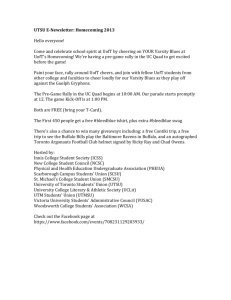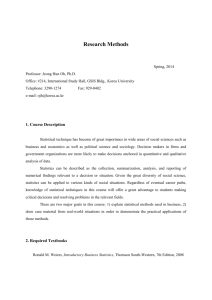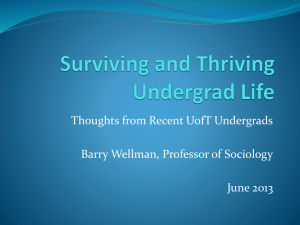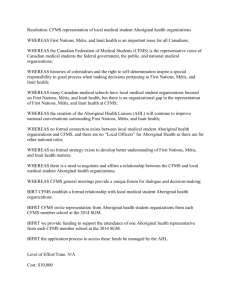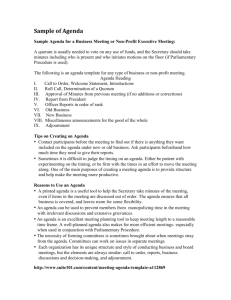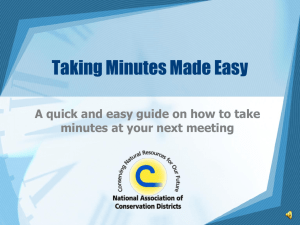AGM 2014 Meeting Minutes
advertisement
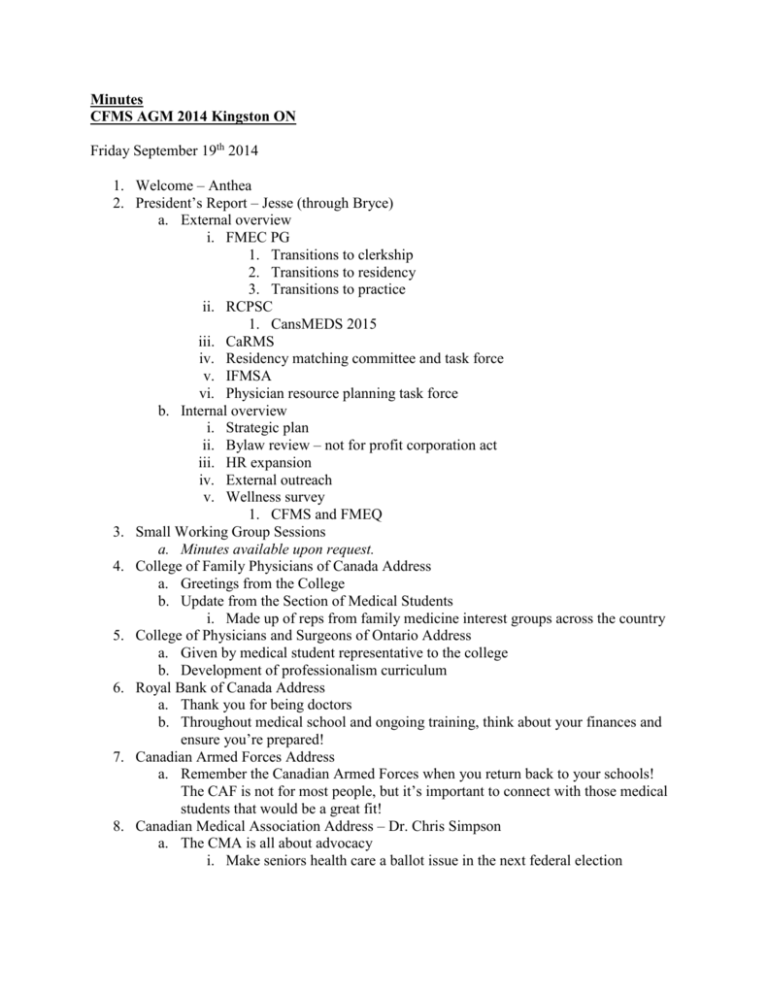
Minutes CFMS AGM 2014 Kingston ON Friday September 19th 2014 1. Welcome – Anthea 2. President’s Report – Jesse (through Bryce) a. External overview i. FMEC PG 1. Transitions to clerkship 2. Transitions to residency 3. Transitions to practice ii. RCPSC 1. CansMEDS 2015 iii. CaRMS iv. Residency matching committee and task force v. IFMSA vi. Physician resource planning task force b. Internal overview i. Strategic plan ii. Bylaw review – not for profit corporation act iii. HR expansion iv. External outreach v. Wellness survey 1. CFMS and FMEQ 3. Small Working Group Sessions a. Minutes available upon request. 4. College of Family Physicians of Canada Address a. Greetings from the College b. Update from the Section of Medical Students i. Made up of reps from family medicine interest groups across the country 5. College of Physicians and Surgeons of Ontario Address a. Given by medical student representative to the college b. Development of professionalism curriculum 6. Royal Bank of Canada Address a. Thank you for being doctors b. Throughout medical school and ongoing training, think about your finances and ensure you’re prepared! 7. Canadian Armed Forces Address a. Remember the Canadian Armed Forces when you return back to your schools! The CAF is not for most people, but it’s important to connect with those medical students that would be a great fit! 8. Canadian Medical Association Address – Dr. Chris Simpson a. The CMA is all about advocacy i. Make seniors health care a ballot issue in the next federal election ii. Secure commitment from leaders of all national political parties to implement a national strategy for seniors care involving all three levels of government with Ottawa taking a leadership role b. Questions i. How do we balance work, life and advocacy and stay well? 1. Importance of destigmatizing wellness and mental health in medicine ii. How do you ensure you align your advocacy efforts with your members ideals and social responsibility? 1. Relevance to the communities we serve is very important, ensuring that the public is involved in the decisions we make and advocacy efforts we focus on. iii. What is federal leadership in the context of provincial health care? 1. Important that we talk about the federal and provincial governments working together. While healthcare may be provincial, the achievement of a healthy society surely isn’t. iv. What allowed physicians to unite so strongly on the campaign for refugee health to enable it to make such important change? 1. It was really a unanimity of opinion, it was easy to get behind v. It’s difficult to make time for advocacy efforts especially in clerkship, how do you see advocacy education working in medical schools? 1. Would like to see medical students swarm the CMA, ask for positions on committees and the board. You have so much to contribute. 2. Call for advocacy education in the curriculum vi. What are your recommendations to us to inspire and encourage civic duty in our peers that may have reservations? 1. Inspiring others to be leaders will be most effective 2. Encourage people to lead in the issues they find interesting, creating networks of leaders 3. Set the example, model how to be a leader, champion an issue that you’re passionate about 9. VP Finance Budget Update – Ben Frid a. Motion to go in camera plus Rosemary i. Moved by Brandon Maser ii. Seconded by David Linton iii. Motion passed, now in camera b. Motion to go out of camera i. Moved by Gord Locke (McMaster) ii. Seconded by Irfan Kherani (UofA) 10. Government Affairs Panel – Melanie Bechard a. Panelists: Justin Neves, Emily Reynen, Michael Arget, Raheem Suleman b. Alberta runs a joint provincial lobby day, this year on the ban of flavoured tobacco. UofA and UofC students (50 students) c. McGill has created a government affairs and advocacy committee that did not previously exist. d. Importance of evidence based policy in our advocacy efforts, this is the mandate of the committee on health policy. e. November 2014 Lobby Day – want the ask to encompass the strategic directions of the GAACs across the country, including feasibility in the current government climate. i. Agreed on focusing on a national pharmacare strategy f. Questions i. How will the upcoming federal election impact our strategy going forward this year? 1. Platforms start to get released about a year to nine months before. This does give us an opportunity to prepare our asks accordingly. Gives us the ability to really engage all three parties. 2. Good year to dream big with the election coming up ii. McMaster has been working to grow their GAAC, what sort of initiatives has McGill done to solidify themselves? 1. The GAAC is large and it has been very useful having a number of engaged students involved. We were able to hold updates for each class and we have broad reaching advocacy initiatives. This gives students choice in what sort of advocacy efforts they’d like to be involved in. 2. Approached people individually to get them involved. They need to feel invested in the process. g. As the CFMS, what duty do we have asking for things specific to medical education and students, compared to asking for things to benefit society? i. We need to think about the patients and this isn’t mutually exclusive to our own needs. The government also seems to listen to medical students more than residents and sometimes physicians. We can leverage this for the good of society, which aligns with our main values as students in the health care system. ii. We also want to consider who’s voice is strongest. If our voice isn’t the strongest on a particular issue, can we find a stronger voice that we can support versus supporting them? Something to consider. iii. There is definitely still a role for the CFMS to advocate specifically on behalf of students. This can still be with the patients in mind. iv. We need to think more globally and think about our relevance in society, we don’t want to be perceived as a group of very privileged people. v. It is morally conflicting to try and use advocating for patients to advocate for ourselves. vi. Although we’re a privileged group, there are physicians who cannot find work and physicians with hundreds of thousands of dollars in debt, not to forget about this. vii. Important that we also discuss advocacy at an individual level, in terms of service versus education. 1. Definitely important to remember the different levels of advocacy and to take advantage of tools available for these different levels of advocacy 2. What are the system problems, how do we change the system so that others aren’t going through the same issues? Trying to solve these individual problems we face at a higher level rather than just making it work for ourselves at that specific time. Saturday September 20th 1. Presentation of the Strategic Plan – Robin Clouston a. Overview of the strategic plan b. New mission, vision, values and guiding principles c. Panellists: Anthea Girdwood, Bryce Durafourt, Irfan Kherani d. General discussion i. In terms of welcoming students from Quebec, is the metric specific enough in terms of numbers? 1. We decided not to specify a target for this. Looking at both individual and institutional members from Quebec over the next few years. ii. Is there a plan for how often we’ll be generating a wellness survey? 1. We do need to see how successful this first survey will be before deciding on how often it might be able to be used. It may be a possibility to make it iterative. 2. This survey is quite a big project between the CFMS and FMEQ and requires extensive resources, the enabling direction in the strategic plan will help with this going forward. iii. Are there more concrete things you’re planning in terms of increasing member engagement? 1. We created a broad strategic direction because we want to be relevant to medical students all the way from acceptance, to preclerkship, clerkship and the transition to residency. Many activities planned to reach out to all of these different groups. 2. Both directions 1 and 2 can actually work on member engagement. Increasing the relevance of our services is very important for this. 3. Making sure that people sign up to the website very early so they get used to using the website from the beginning. iv. Is regional engagement, for example with OMSA and the FMEQ, a goal for you going forward? 1. We definitely wanted to engage the regions and ensured we got feedback and opportunity for discussion with the FMEQ and OMSA. It will be important to continue local engagement, incluing with regions. 2. FMEQ has been working so well alongside the CFMS and have been able to share expertise. CFMS has aided the FMEQ set up a provincial lobby day, and the FMEQ is collaborating on the wellness survey given their experience in this area. v. Is there a goal to include interprofessional education in the strategic plan (direction 3)? 1. The education committee is growing, and one of their tasks is interprofessional education. It doesn’t feature specifically in the broad 3 year strategic plan, but it doesn’t mean that we aren’t working on it. If you want to work on IPE, please contact the VP Education and they would love to have you on board! 2. Address from the Canadian Association of Interns and Residents – Christina (President) a. Training i. Leadership ii. Patient-centered care 1. Handover process iii. Support transitions b. Wellness i. Work environment 1. Resiliency training ii. Culture of respect iii. Resident physician health c. Representation i. Medical education ii. Resident issues d. Discussion of how residency and CAIR are similar and different from medical school and CFMS, importance of continuing advocacy. 3. Resolutions Session 1 (Missing President) a. Nemo Contradicente Voting Rules for 2014 Annual General Meeting i. Moved by Justin Neves (McMaster) ii. Seconded by Mimi Lermer (UBC) iii. Adopted nemo contra b. General Meeting Resolution Spending Guidelines i. Moved by Bryce Durafourt (McGill) ii. Seconded by Ben Frid (Queen’s) iii. Adopted nemo contra c. Adoption of the CFMS Strategic Plan 2014-2017 i. Moved by Bryce Durafourt (McGill) ii. Seconded by Irfan Kherani (UofA) iii. Adopted nemo contra d. Presidents Roundtable Committee Terms of Reference i. Moved by Franco Rizzuti (UofC) ii. Seconded by Taneille Johnson (UBC) iii. Adopted nemo contra e. Adoption of the CFMS Local Representative Committee Terms of Reference i. Moved by Heather Smith (NOSM) ii. Seconded by Alana Fleet (Queen’s) iii. Adopted nemo contra f. Nominations Committee i. Moved by Anthea Girdwood (UofO) ii. Seconded by Mimi Lermer (UBC) iii. Adopted nemo contra g. Adoption of the policy paper “National Pharmaceutical Drug Shortages” to replace the “National Pharmaceutical Strategy” paper i. Executive sponsored ii. Moved by Justin Neves (McMaster) iii. Seconded by Emily Reynen (McGill) iv. Open first Speakers List 1. Nupur Dogra (UofT) – there are opportunities to strengthen to the paper on this strategy. There is only one recommendation from this paper, that this be a federal priority. We should add recommendations about access and quality, can these be added moving forward? If not then I am not ready to vote in favour of this paper. 2. Natalia O (Queen’s) – speaking against the motion. Makes a strong argument in the context of drug shortages but is not a complete national pharmaceutical strategy, it is too narrow to say it reflects our entire strategy. 3. Melanie Bechard (UofT) – in favour of this motion. We decided to narrow the scope to something acute. As we work on lobby day we will be focusing on a national pharmaceutical strategy including 4. Andrew Bresnahan (McMaster) – point of information, 5. Natalia O (Queen’s) – amendment to change the title of the motion rather than replacing the national pharmaceutical strategy to make it a policy paper on drug shortages a. Friendly ammendment v. Vote 1. 7 opposed 2. Motion carries vi. Adopted h. Adoption of the policy paper “Resources to Support the Learning Environment for Clinical Clerks” i. Executive sponsored ii. Moved by Justin Neves (McMaster) iii. Seconded by Melanie Bechard (UofT) iv. Open first speakers list 1. Ali Damji (UofT) – speaking against the motion. Concern that this position may lack some of the background required for stakeholders to respect it. Missing background on current policies that exist, and this could make the document more useful. 2. Ian Brasg (UofT) – speak in favour of the motion. 3. Nabras (McGill) – speak against the motion, unobjectionable in principle, but difficult to see this document being used efficiently in a local setting. What are the goals? a. Justin Neves (McMaster) – if this paper doesn’t pass the current one in existence will be our position paper. Changes were made to structure the paper as our other papers are structured. 4. Melanie Bechard (UofT) – speaking in favour. A position paper outlines what we think about a topic, it isn’t a strategic plan. It makes note of current issues important to the CFMS. v. Motion carries vi. Adopted i. Adoption of the policy paper “Mental Health for Medical Students” i. Executive sponsored ii. Moved by Justin Neves (McMaster) iii. Seconded by Brandon Maser (Queens) iv. Adopted nemo contra j. Adoption of the policy paper “Protecting the next generation from tobacco products and nicotine addiction” i. Moved by Justin Neves (McMaster) ii. Seconded by Nicole Archer (McMaster) iii. Open first speakers list 1. Brandon Maser (Queen’s) – speaking against this because there are some strong recommendations made in this paper that are out of scope of the CFMS. Seems more legal. 2. Rahim (UofA) – speaking in favour of this motion. Broad position paper but broad issue, within the mandate of the CFMS. Recently this was the focus of our Alberta provincial lobby day and we were able to get the government to ban flavoured tobacco in Alberta. This impacts the health of our patients and future patients 3. Connor Sommerfeld (UofM) – speaking against this motion. By suggesting 100% smoke free campuses may limit our ability to reach marginalized populations 4. Jonathan (UofO) – speaking against this motion. More in dept issues here including harm reduction and support of marginalized populations. 5. Russell (UofT) – speaking for this motion. We should still be taking positions on important health issues. We know smoking is unhealthy and we should support these recommendations. iv. Open second speakers list 1. Brandon Maser (Queen’s) – agree in principle with the goals of this paper but doesn’t take into account the population at large. 2. Franco Rizzuti (UofC) – in favour of this motion, in line with provincial and national medical organizations for the benefit of Canadians. This is a progressive paper. 3. N (UofT) – speaking against this motion not in principle but as it is currently written. We see people where we could argue that their medical issues are due to their own choices, but we don’t and we must keep thinking about them. 4. Han Yan (Western) – we have banned other addictive substances 5. Susanne Clark (Dal) – speaking for this motion, it is important not to isolate people but we do need to also work to prevent exposure of others, whether on campus or elsewhere. v. Voting 1. Opposed 12; For 22; Abstentions 2 2. Motion carries vi. Adopted k. Adoption of the policy paper “Reciprocity in International Clinical and Research Electives” i. Moved by Melanie Bechard (UofT) ii. Seconded by Mimi Lermer (UBC) iii. Motion to go in camera by Kimberly Williams (UofC) 1. Seconded by Irfan Kherani (UofA) iv. Motion to go out of camera by Kimberly Williams (UofC) 1. Seconded by Heather Smith (NOSM) v. Vote: 1 abstention vi. Motion does not carry l. Criminalization of HIV i. Moved by Matthew Holland (Queen’s) ii. Seconded by Antonio Lee (UofT) iii. Open first speakers list 1. Bryce Durafourt (McGill) – speak against this motion, in review it does not fit in with the strategic plan. 2. Ian Brasg (UofT) – speak against motion, paper is well written and important topic, but factually disagree with some of the points in the paper. The title is not accurate. Absence of evidence doesn’t create evidence. HIV is no longer unique, we shouldn’t be differentially singling it out. Too many inaccuracies. 3. Antonio Lee (UofT) – speaking for the motion, HIV status alone should not be reason for intent to cause harm, therefore we need a position to help create guidelines around what the intent to transmit HIV means. 4. Meredith Briggs (Queen’s) – proposing an amendment, including extreme cases of negligence a. Open speakers list i. Carl Chauvin (Queen’s) – why is this unfriendly? 1. There is evidence that stigma harms initiatives to do scientific studies. From the research that exists, including medical experts, that the definition of intent cannot be broadened. ii. Bryce (UofM) – it doesn’t matter if we make this amendment, because the paper doesn’t say this. iii. Margerite (UofC) – what does extreme case of negligence means? 1. If someone with a detectible viral load is engaging in risky behaviour, although they are not acting maliciously, they are acting in awareness. iv. Stephen Cashman (UofM) – Agree that this amendment does not change the paper. b. Vote on amendment i. Amendment fails iv. Open second speakers list (Start of Second Resolutions Session) 1. Suzanne Clark (Dal) – speaking in favour, paper is about harm reduction. Highlights that the current criminal approach is not healthy. 2. Stephen Cashman (UofM) – speaking against the motion, there is more than intent in the context of the law. 3. () – speaking in favour, a. Motion to go in camera by Sophie Palmer i. Seconded by Jonathan Clouette b. Motion to go out of camera by Sophie Palmer (Queen’s) i. Seconded by Jonathan Clouette 4. Antonio (UofT) – the current law creates stigma, harms people v. Open third speakers list 1. Jonathan Clouette (Queen’s) – can you explain how the paper is in the scope of the CFMS? a. Patients discuss their issues with people who are not physicians, open up more to those who are in support. This position paper can give medical students the ability to offer their support. 2. (UofO) – in favour, public health efforts around HIV should be evidence based rather than legal 3. (UofM) – not in favour, more evidence in statistics of legal battles, feel less rush to pass this, to continue working on it. 4. (Western) – general student body at Western was in favour of this paper. Students in support of the recommendations 5. Ian Brasg (UofT) – speak against, paper demonstrates poor evidence on the detrimental effect of testing, not explaining why exposure to harm isn’t relevant to law when it is. vi. Open fourth speakers list 1. Nina Nygen (Sherbrooke) – this paper is voicing that the current laws are unfair 2. Brandon Maser (Queen’s) – agree in principle with this paper, not outside the scope of medical students, relevant advocacy. Scope of medical students is not necessarily the scope of the organization. 3. Pham (UofO) – we can all agree that we’re talking about protecting a vulnerable population. We need to start somewhere in changing this law. 4. N (UofT) – we are here to represent the medical students who elected us, please think about what other medical students would say to this 5. Russell Christy () – speaking for the motion, in this document we’re talking about the people who are taking their medications, the people who are being responsible. vii. Open fifth speakers list 1. Claire (UofC) – this paper has come a long way since SGM when there was a lot of controversy. Try and personalise this to yourselves when thinking about the paper. 2. () – your viral load can spike, you can become resistant to therapy, so how can you know the risk of transmission is negligible? a. The paper uses the word “low” rather than negligible and avoided putting more specific guidelines because we can’t keep confirming this. Because we can’t do this, would just shouldn’t criminalize it. 3. Kelly (McGill) – speak in favour, this is controversial, but we have an important role to play in pushing progressive policies. Criminalization stigmatizes patients. 4. Stephen Cashman (UofM) – the paper as written protects people who are acting in good faith, but it also protects people who are acting in bad faith. Happily adopt 99% of this paper but still concerned with a few lines. 5. N (UofT) – can the paper be adopted and then small things changed? a. No intent can’t change after passing viii. Voting 1. Missing – president, western rep 2. For 14; Oppose 10; Abstentions 4 3. Motion carries ix. Adopted m. Strategic Partnership between CFMS and Partners in Health (PIH) Canada i. Moved by: Andrew Bresnahan (McMaster) ii. Seconded by: Ben Frid (Queen’s) iii. Open first speakers list 1. Bryce Durafourt (McGill) – why should we partner with this group in terms of helping them fundraise money? a. Andrew – we offer services for private companies that do bring students to spend money, this would 2. Stefanian Spanos (Queens) – why them, why now, have you turned down other partnerships in the past? a. Andrew – some serendipity, this group is regarded as standard setting, working specifically with ministries of health, very unique model in global health, very strategic and deliberate. 3. Kim Williams (UofC) – we have turned down partnerships in the past. What does the solicitation of funds from students mean? a. Andrew – deliberately reframed this to seek community donates, but the focus will not be on student donations. The partnership does not 4. Ben Frid (Queen’s) – speak in favour, incredible mentorship opportunities, good opportunity for CFMS in terms of branding, in line with mission of the global health program. 5. Brandon Maser (Queen’s) – thank you for outlining the partnership. What is the process if the stipulations of this partnership change (BIFR)? a. Andrew – the BIFRT is a living relationship and how the partnership gets implemented is still in the process of being worked out, including mentorship properties. Any further changes would need to go through the executive. iv. Open second speakers list 1. Shilpa (UofM) – in favour of this motion, fantastic opportunity, actionable 2. Motion to call question by Alana Fleet (Queen’s) a. Seconded by Soniya Sharma (Queen’s) b. Motion passes v. Voting 1. Motion carries vi. Adopted n. CFMS Support for declaration on universal access to affordable medicine i. Moved by Andrew Bresnahan (McMaster) ii. Seconded by o. CFMS engagement with local Aboriginal Health representatives i. Moved by Ryan Giroux (UofT) ii. Seconded by Nupur Dogra (UofT) iii. Open first speakers list 1. Bryce Durafourt (McGill) – point of order, wonder whether we can present a motion that supports presenting another motion at the next meeting. Doesn’t require a resolution. iv. Regarded as out of order – the process already exists and therefore does not require a resolution 4. Address by Dean from the Queen’s Faculty of Medicine – Dr. Reznick a. Welcome to Kingston! Very happy to host the CFMS here. b. Proud of the leadership of the students at Queen’s and across the country. 5. Address from CaRMS – Irving Gold a. Providing information about CaRMS and the match b. Always open to hearing your constructive feedback and concerns c. Dedicated staff working year round to answer your questions and make corrections on your behalf d. Working to better understand the data that we have, look more into the unmatched students – hoping to hold a workshop on this topic at CCME 2015 6. Address from Kirkham and Jack a. Jerseys! b. Disability insurance 7. Resolution session 2 – see continued minutes in the resolution session 1 8. Executive Elections a. Nominee speeches Sunday September 21st 2014 1. Address from the Ontario Medical Students Association (OMSA) – Soniya and Marianne a. OMSW b. Lobby Day and Leadership Summit c. Wellness retreat d. Scrub-In 2. Address from the FMEQ – Serg and Charles a. Represent the 4 medical schools in Quebec b. Collaborating with the CFMS on services c. Many of the same medical organization partners as the CFMS d. Strong voice in wellness i. Wellness day in Quebec ii. Collaborating on the medical student wellness survey with the CFMS e. First provincial lobby day coming to Quebec! f. IFMSA Quebec 3. CFMS Regional Forum a. Panelists – Kimberly Williams, David Linton, Anthea Girdwood, Laura Butler, Bryce Durafourt b. Bryce – fostering a great relationship with the FMEQ. Up to 4 individual members now from Quebec. Most involved with the travel awards, now using the nominations committee. c. Anthea – liaising with OMSA, building the nominations committee. More difficult to organize the external representatives. d. David – although not on OMSA, did go to a few of the meetings. Ontario presidents teleconference. Student initiative grants was main project. e. Laura – focus on SIGs, overhaul of the call for applications, took on organizing the small working groups. Created policy for memorial donations. f. Kim – bringing the west together at the western associate deans meeting. Ice Bowl is important to the schools in the west, continuing communication with them. Chairing the presidents round table. g. Feedback i. Part of the strategic plan is creating an organized chart for the governance structure. Is it possible to include the structure of individual schools as well? For contact information and such? 1. This is a key priority, to get an organizational chart together. So everyone knows who is doing what, who is on each committee. We will hopefully have it on the website and distributed to schools. 2. Create a template to be available to schools, have been trying to keep a master contact info document up to date, but with committees and positions being decided at different times it has been very challenging doing this. In a better position this year to make this available. ii. How can we get UBC better involved in IceBowl? 1. Getting the other schools to help excite UBC students. Hopefully having UBC host the meeting this upcoming year with the backing of the other schools. iii. Is there any plan for the western reps to have a more personal presence in the schools? Maybe physically coming or making videos? 1. Those are great ideas, sometimes financially difficult but could do a better job by using technology. We can always do a better job of student engagement. 2. In Ontario and Quebec there are regional organizations that tend to be better well known. As we continue to work with these groups we are always there and getting visibility through these groups. Important to have face time with students. 3. Might be important to create a budget if possible to help the regional reps get out and make site visits and meet with students in their region. 4. We take your feedback and maybe we can work to fund regional reps in these endeavours. 4. Members Voices Forum a. General member engagement i. What incentives can we bring to connecting with general members – maybe we can lead mentorship, leadership talks, town halls, to get students engaged. Bring students from other schools to do talks. b. How will the VP Education engage local students on medical education topics? Presidents are making a toolkit for accreditation, maybe the education committee can create tools like this? i. Collaboration on the education front is still just starting. Lots of opportunity for the membership to shape this. There is now an education listserve for sharing of information. ii. How about having an education round table at SGM and AGMs? 1. We are limited by the number of delegates we can host and the number of delegates who can be funded. Big challenges there. c. Small working groups – we get good member engagement, how are those ideas translated into action on behalf of the CFMS i. Something that needs improvement, get great brainstorming but difficult to put this all together. Sometimes these translate into resolutions, which then do become action items. ii. We are limited in our ability to put some of these into action because we’re only so many people. Encourage you to explore those initiatives and take a leadership role on those. iii. We could work on making the small working groups come up with a plan and an action item, potentially change the format to going to only one small working group. d. How do we make the position papers available earlier, how do we make sure our opinions are in line with students? i. Very important to work toward. We need everyone to take that time to survey the student bodies. There are a lot of barriers to getting this feedback especially prior to AGM. ii. We are elected to make decisions for our students and we need to take that responsibility. iii. Maybe we can find some more time to bring in the experts and also hear about the follow through after a paper is passed e. As a first year student wouldn’t have known about CFMS if it wasn’t at Queen’s. Having things like the small groups at each school so that local students can have the same conversations. i. Yes that sounds awesome, we need leadership at each school to do this! 5. Address from the incoming CFMS president – Bryce Durafourt a. Thank you to the membership b. Thank you to our sponsors c. Thank you to our chair Anthea d. Thank you to our organizer Branden e. Thank you to Rosemary f. Priorities i. Implementing the strategic plan ii. Wellness survey in collaboration with the FMEQ iii. AFMC residency matching task force 1. Concern about the increasing rate of unmatched students iv. CanMEDS 2015 v. Partnerships 1. CMA a. Online leadership modules b. CMA GC Ambassador Program vi. Human Resource needs 1. We have grown in size and scope but rely heavily on our one terrific staff member. We need to look at how we can better meet our human resource needs. vii. Bilingualism viii. Member engagement 6. How to get involved a. Centralized fall applications, then a winter application period b. President elect at SGM 2015 c. Get us your feedback! 7. Final Members Voices Forum a. What does advocacy look like on the service provider level (in clerkship)? Could be interesting to see us have some national discussion about clerkship service b. c. d. e. f. g. advocacy. Could be useful in bringing students into the CFMS realm that aren’t interested in the policy level. i. Highlighting stories is a great opportunity for projects that can be done. Should also continue to encourage local opportunities for advocacy training. ii. Focus groups are a great way to collect data, would be a great methodology to get data. OMSA and CFMS could work together to have students from across the country add stories about their service advocacy to the OMSA blog, would be great to involve students from across the country in this. i. Yay! How do we engage first year students when they’re intimidated by these big positions? i. In terms of running for executive positions, the best way to find out is to read the reports from the executive. Encourage them to talk to the executive about their role, ask them questions. ii. It’s also a school cultural thing, some schools are very engaging with their students. iii. Encourage them that they can take it on, that they can learn through the position Can we involve the faculty or program directors in demystifying that these time commitments i. Definitely school specific The reports still don’t give us a good sense of what you do or how many hours you work on your projects. How about a little video interview? i. We can improve this, that’s definitely a neat idea ii. Keep asking questions Definitely areas that the CFMS should be taking credit for in clerkship vs preclerkship. Do you see the gap? i. We do. Many schools are different in how they give time off and how they let clerks attend meetings. This adds extra challenges for them. There are gaps in services and it can be difficult to reach them. ii. Pursuing advocacy on vacation days in clerkship on a national level iii. Much of the power to make key decisions is decentralized, your school may have a policy at the dean level, but if your supervisor or clerkship director of that rotation doesn’t think it’s valuable they won’t give you that time off. Maybe we can make a form letter to be distributed to those people making this decisions? iv. Very school variable. Could there be someone responsible for student initiatives, take ideas from the working groups to the students. i. Can’t create a new position, but we can try and take that and distribute it among the exec. ii. Could be given to the regional reps, and some of the national officers as well. Our emails are on the website, you can all contact us, and also distribute that to students. 8. Closing a. Motion to destroy ballots i. Moved by Ali (UofT) ii. Seconded by Soniya (Queen’s) iii. Motion carries b. Motion to close meeting i. Moved by Carl (McGill) ii. Seconded by Narayan (UofT) iii. Motion carries
